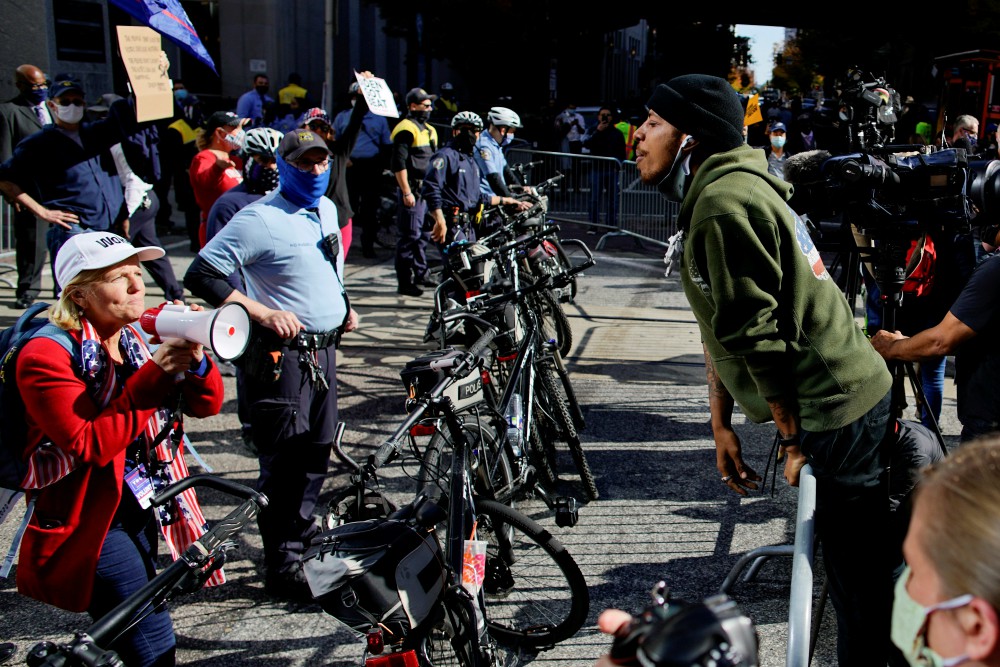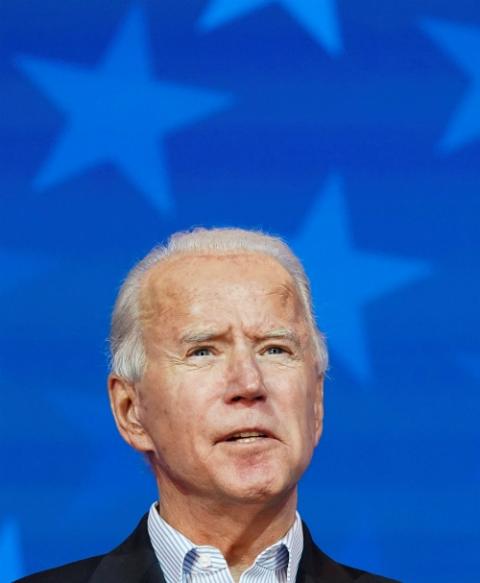
Supporters of President Donald Trump and Democratic presidential nominee Joe Biden shout at one another in Philadelphia during the vote count Nov. 5. (CNS/Reuters/Eduardo Munoz)
During the final week of his presidential campaign, Joe Biden said, "Pope Francis has asked questions that anyone who seeks to lead this great nation should answer." Now, as Biden is set to become the second Catholic president in the history of the United States, some Catholics are wondering if the candidate who regularly talks about his own faith and ran on a platform of bringing together the nation can also manage to help heal his own deeply divided church?
"The Catholic Church in the United States is as divided as the country's politics, and often because of politics," said David Gibson, director of Fordham University's Center on Religion and Culture.
Throughout the campaign, Biden — whose support for legal abortion puts him at odds with church teaching — was subject to criticism about his faith, with some church figures suggesting he is not a real Catholic. Yet some church observers are warning that such hostility could backfire and further alienate Catholics who support the president-elect.
Further, they believe that church leaders would be wise to seize on Biden's eagerness to bridge national divides and seek to emulate that approach within the church.
"Many partisans on the right will continue to try to use Biden's faith as a cudgel to smack him with at every chance," Gibson told NCR. "But Joe Biden is really 'Joe Catholic.' He looks and acts and talks like the vast majority of practicing Catholics in this country. Trying to use his Catholicism against him for partisan ends could backfire once he is president."
"The campaign will be over, and Donald Trump will be offstage. Further attacks on Biden's faith might — just might — prompt some soul-searching among Catholics about how their faith is deployed in the public arena," he continued.
According to exit polling from the Associated Press, Trump won 50% of the Catholic vote with Biden winning 49% of it. Yet Trump's support among white Catholics declined from four years ago, where he won 64% of the white Catholic vote compared to Hillary Clinton's 31%. In 2020, 57% of white Catholics backed Trump and 42 % supported Biden.
Meanwhile, Hispanic Catholics supported Biden by 67% to 32% for Trump, although in Florida and Texas Trump improved his performance among Latino voters by 6 and 11 points respectively.
Advertisement
"Biden's win is in large part thanks to Latinas, particularly in the West and Southwest but also in urban centers everywhere," said Natalia Imperatori-Lee, who is a professor of religious studies at Manhattan College. "Latinas do the heavy lifting in the church and in the world, as we see again and again."
She told NCR, "For Latinx Catholics, specifically, this victory is important because Biden cares about the issues they care about: compassion for immigrants and asylum seekers, a desire to rectify the evils committed specifically against migrant children in the Trump administration."
"Biden also cares about climate, which is incredibly important to the Latinx Catholic communities across the country," Imperatori-Lee added.
If John F. Kennedy was the youngest candidate to be elected U.S. president in 1960, Biden will be 78 years old when he takes the presidential oath in January, making him the oldest candidate to take office. Yet in the same way Pope Francis, now 83 years old, has helped reenergize many Catholics across the country and the world, some believe that Biden would do well to appeal to churchgoers who are attracted to the octogenarian pope's vision for society.
Stephen Schneck, a co-chair for Catholics for Biden and a public policy expert, said Trump's presidency was "divisive" for the U.S. bishops' conference. "The polarization the president brought to American politics played into the divisions of the conference and reinforced the tensions between the American episcopacy and Pope Francis," he told NCR via email. "The election of Biden offers a chance for a reset."
"A Biden administration, despite the important differences it will have with the conference on abortion, offers a reliable partner for the bishops on a host of social justice, Creation care, and peace issues that have been highlighted by Pope Francis," said Schneck, executive director of Franciscan Action Network.
Schneck called Biden "a centrist Democrat" and "a Catholic who loves his church," adding that "we can expect that the Biden administration will not fan the divisions among America's bishops like we saw under Trump."
"I'm not expecting an era of good feelings, but I am expecting a restoration of normalcy between the presidency and the bishops, marked by professionalism, respect, and openness to practical cooperation on both sides," Schneck said.
Steven Millies, director of the Bernardin Center at the Catholic Theological Union, believes the church has lost trust and needs to try a different approach to the world. “And young people have shown us they want something better, a vision startlingly close to Pope Francis and Catholic social thought."
"The opportunity for a second Catholic president of the U.S. to draw those pieces all into conversation, for his own public faith in the church and our free republic to be the lens that focuses a better picture of our best selves is unprecedented," he told NCR in an email. "It will not be easy and it won't happen automatically. We know there is a lot of opposition. But there are reasons to hope, and we all need hope and help for it to happen."

Joe Biden makes a statement on the presidential election results during a brief appearance before reporters in Wilmington, Delaware, Nov. 5. (CNS/Reuters/Kevin Lamarque)
Such opposition has been on display in the days following the election, with some Catholic leaders repeating false claims that Biden's victory was due to fraudulent voting activity.
Raymond Arroyo, a host of the Trump-friendly and anti-Francis Catholic media conglomerate EWTN, tweeted, "We may never know the extent of voter fraud in this election or if those activities altered the eventual outcome."
The fringe right-wing group Catholic Vote echoed Arroyo, tweeting out, "The cloud of illegitimacy over Joe Biden will be far greater than any alleged Russian interference."
Yet beyond Biden's entrenched Catholic critics, if there is a singular issue that has come into the fore for both the country and the church as an immediate challenge, it's that of racial justice. For the Biden campaign, one of its closing arguments to people of faith was that racism was the defining religious issue in the election.
Too often, the phrase "healing a divided church and nation" is "coded language for saying we need to make those who enable and perpetuate white supremacy feel better since the last thing the rest of us are supposed to do is make them feel uncomfortable" said Dr. Tia Noelle Pratt, a sociologist specializing in systemic racism in the Catholic Church and how that racism impacts African American Catholic identity.
"That mindset is part of what's gotten us as a society and a church to the place we are in," she told NCR. "It is in being uncomfortable that we can learn and grow."
Looking ahead to a Biden administration, she said that will require more than rhetoric.
"What's needed now is continuing to move forward in smashing systemic racism and white supremacy in order to build a world, a society and a church that is just and equitable," said Pratt.
Imperatori-Lee concurred, saying that as a member of the Cuban American community, she hopes this election "closes the door" on viewing the Latinx community as a monolith and that "just because the dominant culture in the U.S. views Latinxs as objects of racism does not mean that Latinx communities do not participate, historically and in the present, in anti-Black and anti-indigenous racism."
"Biden will lead at a time when Catholics in our church and in politics are deeply divided," said John Gehring, Catholic program director at Faith in Public Life Action. "There is no encyclical or executive order that can change that reality. But I expect he will take the bully out of the bully pulpit, and speak with humility and grace. He will look to build bridges."
Gibson agreed saying, "Biden is a common ground, common good Catholic."
"If his faith is seen as integral to his efforts to heal the country, then that will be a good look for a Catholic Church that has had little to show for all the years of culture warring by the institutional leadership," he continued.
"Joe Biden has a chance to show the kind of Catholic leadership that the church's ordained leaders too often haven't been able to provide."
[Christopher White is NCR national correspondent. His email address is cwhite@ncronline.org. Follow him on Twitter: @CWWhite212.]






